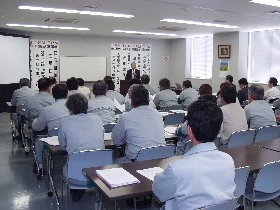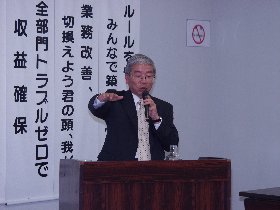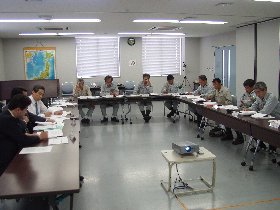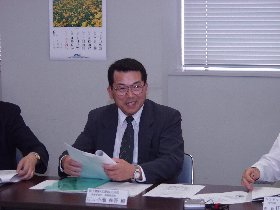|
|
 |
On 14th June 2002, the 37th Safety Caravan was held at Ariake Machinery Works of Hitachi Zosen Corporation, which is located in Nagasu-machi, Tamana-gun, Kumamoto Prefecture. |
Safety Presentation
|
About 40 persons, including the staff of Ariake Machine Works and cooperating companies attended the Safety Presentation. At the beginning of the Presentation, Mr. Takeo Koike, President of Hitachi Zosen Diesel and Engineering Co., Ltd. gave an address and said, "We are engaged in the manufacture of nuclear-related machinery and recognize the safety management of nuclear energy as a whole as a very important subject of daily activities. Although safety management is our daily routine, internal control tends only to be dependent on the tolerance of the internal staff. We would like to review our daily safety management through today's presentation and information exchange sessions."
|

Safety Presentation
|
After the address, Mr. Umezu, Secretary-General of NSnet introduced NSnet activities, followed by a lecture entitled "God Regrets Creating Humans" delivered by Mr. Susumu Tanabe, Deputy Manager of the Nuclear Power Safety Research and Training Center of Shikoku Electric Power Co., Inc.
|
During the lecture, the lecturer showed accident instances that the lecturer himself had encountered and lessons that could be learned from such instances.
As an example,
<my senior colleague got an electric shock by touching a part charged with 60,000V with an insulation resistance tester by mistake.>
- He failed to recognize the part because work partitions had been removed even though the work was not finished. Although several people were working, only one person was familiar with the area. It is important for several well-informed workers to double-check and follow the appropriate work procedures. |

Mr. Tanabe
|
<when disassembling an oil strainer, the oil spewing out was ignited and three people were killed or wounded when they tried cope with the situation>
- Even though you know you have to "evacuate first" in your mind, you try to hold back in an emergency situation. It is important to act calmly, giving safety the highest priority.
Lessons that can be obtained from these instances include:
- The victims met with the accidents because they worked on my behalf (lecturer) out of kindness. When the work object check, it is important "not to depend on others," rather than thinking "Mr. XXX has checked".
- As a proverb says, "it is the last two steps that are dangerous when you climb down a ladder," it is dangerous at the last moment when you are about to be relieved from strain.
- Humans are animals that make mistakes. It is important to strictly observe what has been prescribed.
As you can see, it was a lecture based on actual experience, which was familiar and persuasive to those who work on the spot.
Safety information exchange session |

Safety information exchange session
|
At the safety information exchange session, at the request of Hitachi Zosen, Mr. Shingo Koike, Senior Group Leader of the Fuel Manufacturing Department of Tokai Works, Nuclear Fuel Industries, Ltd. was invited to make an in-depth presentation of the good practice "Making and Using a Human Error Database" from the peer review of Tokai Works.
Subsequently, details of the good practice were actively discussed and information and opinions were exchanged. In addition, Hitachi Zosen showed their activities to promote nuclear safety culture at the works, which was followed by information and opinion exchange.
|

Mr. Koike
|
Major opinions were as follows:
- Regarding the methods for sharing human errors and so-called "Hiyari-Hatto" (Near Accidents) events, those clearly identified as human errors will be recorded as data, but "Hiyari-Hatto" events will not be revealed unless they are declared voluntarily (Hitachi Zosen).
- It is certain that they are not easily revealed. It is worth mentioning that "the aim of the activity is to identify potential factors so that they can be corrected, rather than thinking that it is no good to reveal such events," or making "Hiyari-Hatto" declaration forms anonymous (NSnet).
|
|
|







